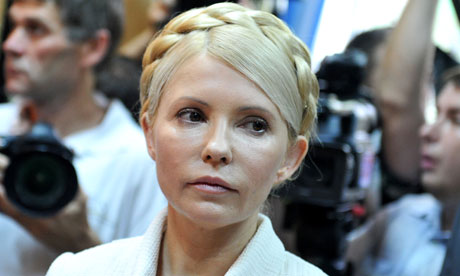
Ukraine’s International Isolation Grows
Publication: Eurasia Daily Monitor Volume: 9 Issue: 4
By:

The EU’s refusal to initial the Association Agreement (which includes a Deep and Comprehensive Free Trade Agreement) at the December 19, 2011, EU-Ukraine summit in Kyiv was a geopolitical setback. Initialing is a technical stage meaning that the negotiations are completed. The second stage is the agreement signed by the European Council (EC) and the third stage would be the EC recommending ratification by the European Parliament and 27 EU member parliaments.
Former US Ambassador to Ukraine, Steven Pifer, pointed out: “A failure to secure a solid relationship with the West will cause imbalance in Ukraine’s foreign policy. That would leave Kyiv more isolated and susceptible to pressure from Moscow” (https://www.brookings.edu/opinions/2011/1226_ukraine_pifer.aspx). Negotiations over a gas deal to replace the 2009 contract are slow because Kyiv has given Moscow the diplomatic advantage.
European Commission President, Herman Van Rompuy, explained that progress on the agreement: “will depend on political circumstances” and “our strong concern is primarily related to the risks of politically-motivated justice in Ukraine. The Tymoshenko trial is the most striking example” (https://www.european-council.europa.eu/home-page/highlights/conclusion-of-talks-on-a-major-deal-with-ukraine?lang=en). The Kharkiv Group to Defend Human Rights issued a report documenting growing politically motivated repression in 2010-2011, with Tymoshenko as only the most visible case (https://www.khpg.org/index.php?id=1321885956).
Rompuy’s statement followed recommendations by the European Parliament in its October 27 resolution that negotiations continue but remain dependent on Ukraine reversing politically motivated trials of opposition leaders (www.europarl.europa.eu/sides/getDoc.do?type=TA&reference=P7-TA-2011-0472&language=EN&ring=B7-2011-0552). The resolution was supported by the Socialist Political Group in the European Parliament that had hitherto cooperated with the Party of Regions.
Kyiv’s handling of its relations with the EU has combined incompetence and deliberate antagonism and deception towards the West. Five examples of this pattern follow.
1. Yulia Tymoshenko was sentenced to seven years imprisonment on October 11, 2011, leading to widespread Western condemnation. One day later, additional charges were laid against her and the number has since grown to ten (see “Piling Cases on Tymoshenko” at https://www.kyivpost.com/news/nation/detail/116273/). Her sentence came only nine days before Yanukovych’s planned visit to Brussels leading to the cancellation of his visit.
2. In September 2011, Yanukovych deceived EU leaders at the Yalta European Strategy and Warsaw Eastern Partnership summits by promising a compromise would be reached through the de-criminalization of the 1962 article used to sentence Tymoshenko. On November 15, the Party of Regions voted down an opposition motion to decriminalize the article.
The vote took place one day before the Wroclaw meeting between German President Christian Wulff, Polish President Bronisław Komorowski and Yanukovych, where he was presented with three letters. The first listed his broken promises to the EU and US. The second spelled out twelve steps Yanukovych had to undertake (including freeing Tymoshenko) with a threat that the West would take tougher action if these steps were not undertaken. The third was from the US and outlined its strong backing for the EU’s position.
Yanukovych’s deception and demonstrative aggression on the Tymoshenko case tilted the balance in the EU toward enlargement skeptic countries such as Germany. Polish Senate Chairman, Bogdan Borusevic, revealed that the Polish Presidency of the European Council continued to support the signing of the agreement, “but unfortunately we are currently in a minority” (www.pravda.com.ua/articles/2011/12/19/6848306/).
3. Ukraine demanded the Association Agreement include a reference to membership prospects. As Tatyana Sylina points out, “a demand for a perspective of membership in the family of democracies when the opposition are being shoved into jail, when there is suppression of freedom of speech and the country is reaching new heights of corruption is just plain arrogance” (https://dt.ua/POLITICS/tuman_rozsietsya,_vagonchik_rushit-91880.html).
4. Yanukovych overplayed the geopolitical threat that Ukraine could re-orientate its foreign policy to Russia if the EU did not initial and sign the agreement. A leak alleged Yanukovych planned not to attend the EU-Ukraine summit and instead participate in the Eurasian Economic Council meeting in Moscow being held on the same day. The reality is that Ukraine is not a geopolitical priority for the Obama administration, as Ambassador Pifer pointed out at the Open Ukraine conference at the Czech Embassy in Washington on December 9, 2011.
5. Four days after the EU-Ukraine summit, a Kyiv court rejected Tymoshenko’s appeal and on December 29 she was transported to Kachanivska Penal Colony No. 54, near Kharkiv. Not coincidentally on the same day, Yanukovych annulled the November 22 Day of Freedom holiday introduced in 2005 to commemorate the Orange Revolution (www.president.gov.ua/documents/14356.html). The EU and European People’s Party, of which Tymoshenko’s Batkivshchyna party is a member, condemned Tymoshenko’s transfer to the penal colony. US State Department deputy spokesman, Mark Toner, said “The United States was disappointed that the Kyiv Court of Appeals upheld the conviction of former Prime Minister Yulia Tymoshenko on December 23, and did not address concerns about democracy and rule of law raised in the initial trial and sentencing” (https://www.state.gov/r/pa/prs/dpb/2011/12/179719.htm).
Tymoshenko’s transfer and the annulling of the Orange Revolution holiday confirmed that Yanukovych (not oligarchs) directs the Tymoshenko case. US Embassy cables from Kyiv released by WikiLeaks showed he had long sought revenge for his humiliation in the 2004 elections. Yanukovych acts with the intention of staying in power for the long term and believes the only person who could upset his plans is Tymoshenko. Her sentence of seven years in prison and a three year ban from official positions removes her from the next three parliamentary (2012, 2016, 2020) and two presidential (2015, 2020) elections; giving Yanukovych and the Party of Regions monopolization of power into the next decade.
Yanukovych is paranoid about Tymoshenko and this over-rides everything else (see EDM, November 18, 2011). Political expert Vadym Karasiov believes “There is more irrational than rational” in Tymoshenko’s transfer. She was not permitted to attend a New Year’s Eve concert in the penal colony because of fears she would agitate prisoners (Ukrayinska Pravda, December 31, 2011).
Ukraine-EU relations have reached a deadlock while Georgia and Moldova are proving to be better reformers and negotiations for their Association Agreements are making more progress (see European Integration Index for Eastern Partnership Countries report at https://www.irf.ua/index.php?option=com_content&view=article&id=34982:2011-12-01-06-34-45&catid=28:news-euro&Itemid=32). Calls for sanctions are already growing and will increase throughout 2012, especially if fraudulent elections are not recognized by the West. European Council on Foreign Relations Senior Fellow, Andrew Wilson, argued ahead of the EU-Ukraine summit “The EU must also introduce visa bans and sanctions that target travel and financial privileges for individuals within the government who are responsible for backsliding” (https://ecfr.eu/content/entry/ukraine_after_the_tymoshenko_verdict).
Three events in 2012 will lead to a further deterioration in Ukraine’s relations with the West. In the spring, the European Court on Human Rights (ECHR) will rule on the Tymoshenko case, most probably demanding her release. Yanukovych will not implement the ECHR ruling even though they are compulsory for member states. The Euro-2012 football championship over the summer will be accompanied by political demonstrations. Finally, with collapsing popularity for Yanukovych and the Party of Regions, the October elections are inevitably going to be falsified leading to mass protests.




